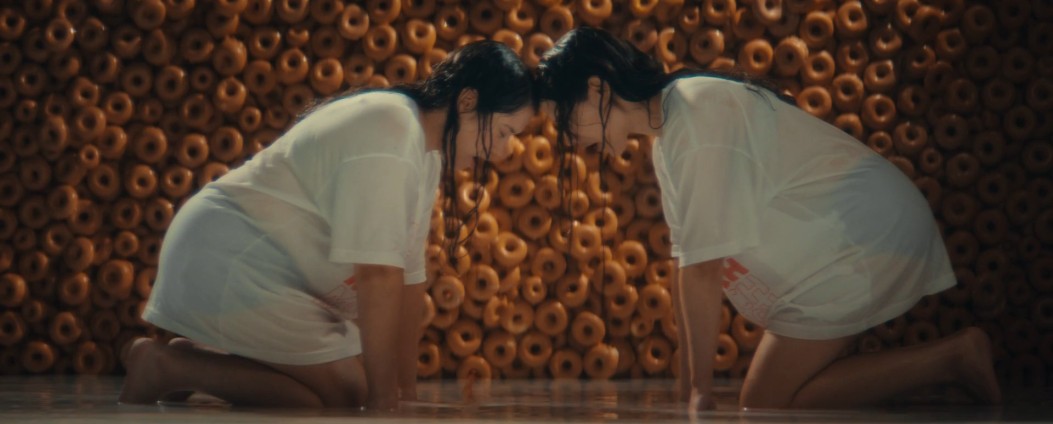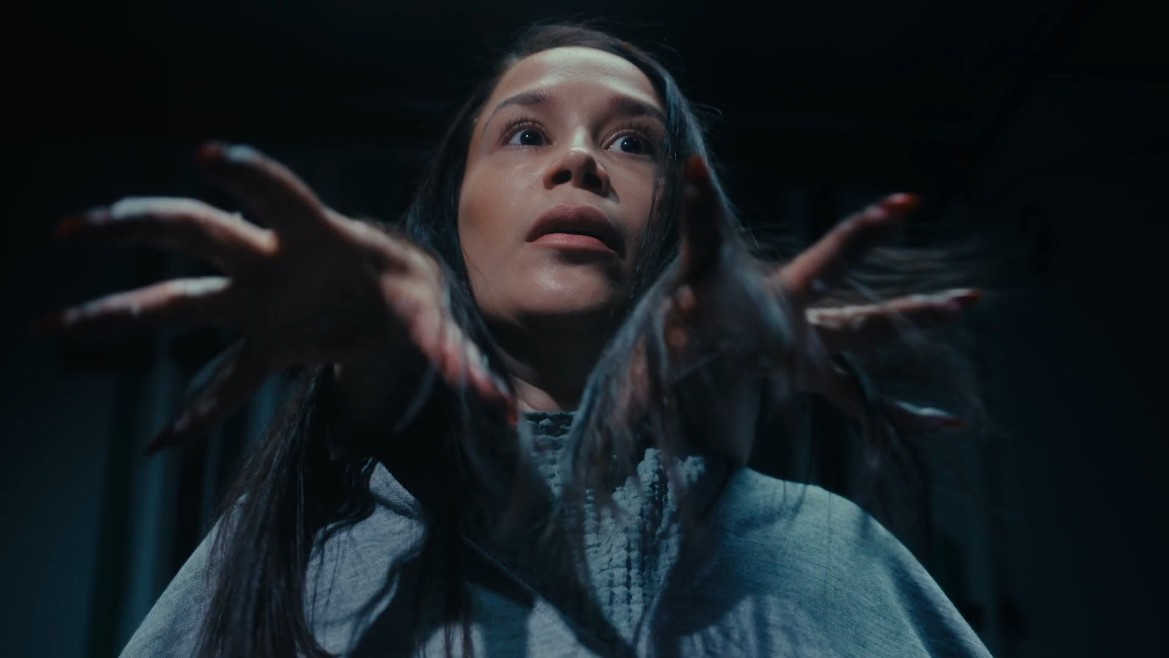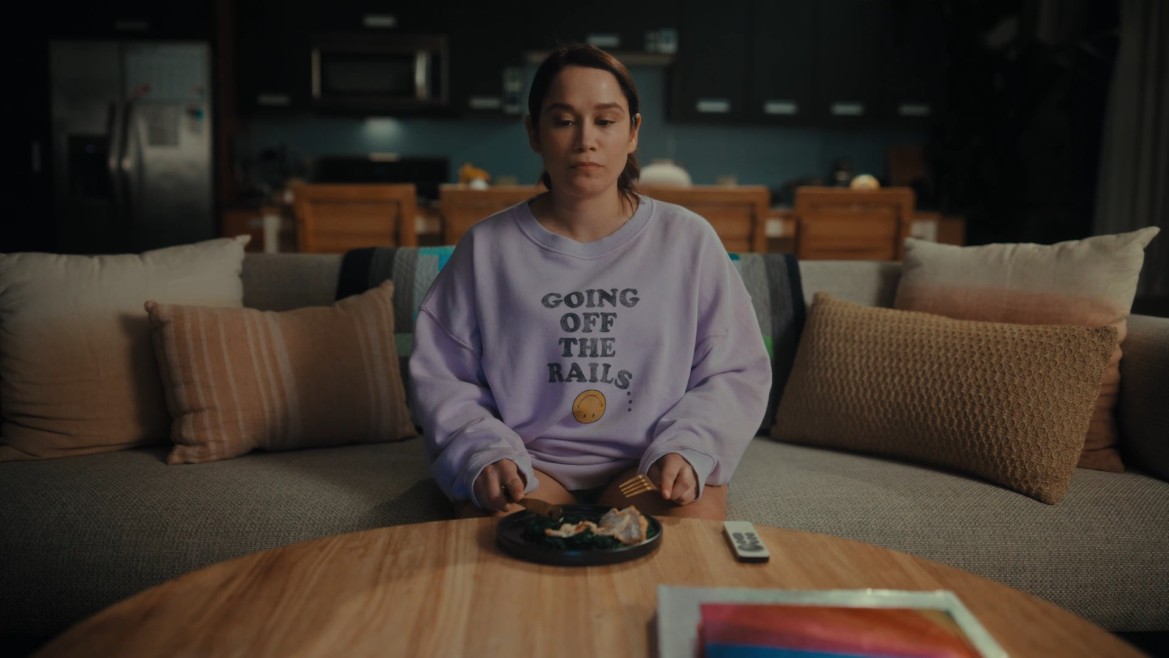Michelle and Melissa Macedo are identical twins born in Pasadena, California. Michelle graduated from Emerson College with a B.F.A. in Acting and Melissa graduated from Barnard College, Columbia University with a BA in theatre and gender studies. They have developed a multifaceted artistic career spanning film, music, and theatre.
Together, they form the band Macedo, featured in outlets like NPR and SiriusXM, and have performed at festivals including SXSW. They also co-founded the theatre company World Kin Ensemble, focusing on important topics such as consent and sexuality in university settings.
In film, the sisters have appeared in productions such as Girlboss (Netflix), Blood Heist (2018), Confessions of a Teenage Jesus Jerk (2017), and Every Time I Die (2019). In 2025, they starred in the body horror-comedy Thinestra, directed by Nathan Hertz, which had its European premiere at the Sitges International Fantastic Film Festival.
Q&A
Hello girls! Your latest film, Thinestra, had it’s European premier at the Sitges Film Festival: You play Penny and Penelope in Thinestra, a movie that discusses very serious topics, like body dysmorphia, diet culture and the pressure that society puts on women's bodies. What were the challenges and joys of portraying such contrasting characters? How did you approach subjects like body image and identity in this film?
Absolutely. Many women have approached us and let us know how accurately the movie portrays the way an eating disorder can take total control of your life. There is so much pressure to attain the unattainable. Toxic positivity can also make everything more difficult because there’s a pressure to love yourself as you are, and if you don’t you’ve failed in some way. We’re so happy people can feel that they’re not alone.
You both have mentioned in previous interviews that you hope people leave the theatre being kinder to themselves after watching the movie. Were there any responses that particularly surprised or moved you after its premiere?
Absolutely. Many women have approached us and let us know how accurately the movie portrays the way an eating disorder can take total control of your life. There is so much pressure to attain the unattainable. Toxic positivity can also make everything more difficult because there's a pressure to love yourself as you are, and if you don't you've failed in some way. We're so happy people can feel that they're not alone.
The film also explores themes of sisterhood and identity — how did your real-life twin relationship inform the characters of Penny and Penelope?
We are very grateful that we had each other in this process. We play one character with two different iterations. We’ve worked on projects together and it’s always so nice to have a supportive presence on set. Individually our process was very different. Penelope is a representation of Penny’s shame, so Penelope was all about exploring ravenous hunger while Penny was focused on hiding and making herself small. In essence, we both explored opposite spectrums of shame. We did quite a bit of training and preparation for this role. We worked with an incredible movement coach, Erika Ackerman, who helped us discover the physicalities and vocalizations of both Penny and Penelope. We were both present on set regardless of who was filming that day so we could observe the arc of each other’s characters. Since we play two different sides of the same person, we wanted to ensure there was a consistency throughout Penny/Penelope’s journey.
Did the festival environment change the way you experienced watching your own film?
Yes! It was incredible to see support from people who genuinely love horror movies. There is a bond and understanding that horror fans share. We felt especially supported by the WomanInFan community. We were thrilled that so many people were interested in the movie and we loved hearing the reactions in the theatre. We felt so welcomed and many of our new friends came to support our screening. We actually had to turn many people away because we had run out of seats! It was moving to see that kind of support. It's always difficult to put something out there that you worked so hard on, it can be so vulnerable but knowing that we are amongst a supportive crowd who all love that genre made it much easier.
Together, you co-founded the theatre company World Kin Ensemble. What motivated you start it, and how has it influenced your professional growth?
We have always been passionate about feminism and the ways in which gender, class and race informs people’s experiences of the world. We were seeing misinformation about consent and the spectrum of violence against women. We wanted to educate people on how boundaries are violated in both big and small ways. Our culture is deeply steeped in misogyny which greatly contributes to violence against all genders. By shedding a light on these cultural attitudes, we felt it could start an important conversation.
You both toured with the company with a show co-created with Shaheen Vaaz called Dirty Talk, that focuses on topics like consent, sexuality, and identity. Why are these themes so important to you as artists? How do you decide which stories or plays to develop and bring on tour?
For this show, we interviewed over 200 people from all walks of life. We interviewed professors, advocates and victims. We wanted to represent a huge range of experiences and backgrounds. As artists, it’s important to explore every angle of a complex topic. We explored the topic of sexual intrusion which includes anything from cat calling to sexual assault.
Not only are you both actresses, but you are also singers. How do you balance your acting careers with your work in the band Macedo? Do you find inspiration crossing over between music and performance?
Balancing our acting careers with our work in Macedo has definitely been a creative juggling act, but one that feels really natural to us. Music and acting have always fed each other — they’re both about storytelling and emotion, just expressed in different forms. When we’re writing songs, we draw on the same sense of character and narrative that we use in our acting. And when we’re performing on set or on stage, the musicality of rhythm, tone, and energy that we’ve developed through music often informs our performances.
We’ve learned to let one art form recharge the other. When we spend time making music, it reminds us why we love performing — it keeps us connected to something personal and expressive. And when we’re deep in an acting project, that experience brings a new depth and perspective to our songwriting. So even though balancing the two takes effort, the crossover keeps both worlds feeling fresh and creatively alive.
What have been the biggest challenges you’ve faced as Latina women in acting, producing, and music? Have you noticed positive changes in representation and inclusion for women in film over recent years?
One of the biggest challenges we’ve faced as mixed women in acting, producing, and music has been representation — both in visibility and in how our stories are told. For a long time, we didn’t always see people who looked like us or came from backgrounds like ours reflected authentically on screen or in the industry. There were moments when we felt like we had to fit into predefined boxes or constantly prove that our perspectives belonged in the conversation. That pushed us to take ownership of our work — to create, produce, and tell the kinds of stories that reflect the complexity of who we are.
The good news is that we’ve seen meaningful progress in recent years. There’s more dialogue around inclusion, and more women — especially women from diverse backgrounds — are shaping projects as writers, directors, producers, and composers. The industry is slowly beginning to recognize that representation isn't just a trend; it's essential for telling richer, more truthful stories.
For us, that change reinforces why it’s so important to keep showing up authentically and to support others doing the same. We want to be part of a generation of artists helping to build a more inclusive creative landscape — one where everyone’s story has the chance to be heard.
You have also been part of different shows, both on Netlfix and Hulu. How does your approach to acting change when working on a TV series compared to a feature film? In a film, everything is condensed — how do you prepare differently for the intensity and pacing of a single story?
We love working on both. Whether it’s a film or a TV show the tone informs how we prepare. At its core, we just want to focus on the story the project is telling. In independent film, you get very close and create a family. We love having the opportunity to bond with all of the incredible people on set.
And finally, looking forward, what kind of legacy would you like to leave as artists in film, theatre, and music?
Wow, that is such a good question. As artists working across film, theatre, and music, the legacy we’d like to leave is one of authenticity, connection, and impact. We want our work to remind people of our shared humanity—to make audiences feel seen, challenged, and inspired. Whether it's through a performance, a story, or a song, we hope to create work that sparks dialogue and leaves emotional footprints that last beyond the moment of experiencing it.
We also want to contribute to a more inclusive creative landscape—to open doors for underrepresented voices and help redefine what stories get told and who gets to tell them. If, years from now, someone feels empowered to express themselves because they saw our work or our journey, that would be the legacy we’d be most proud of.
Previous content
Ozzy Osbourne: The Voice That Made Music Out of FearNext content
Alpha: Interview with Julia Ducournau

